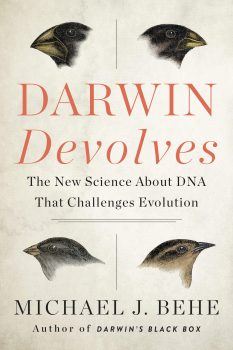I’M OFTEN ASKED what I do for a living. My answer, that I am a professor at the University of Kentucky, inevitably prompts a second question: “What do you teach?” Responding to such a question should be easy and invite polite conversation, but I usually brace for a negative reaction. At least half the time the person flinches with disapproval when I answer “evolution,” and often the conversation simply terminates once the “e-word” has been spoken. Occasionally, someone will retort: “But there is no evidence for evolution.” Or insist: “It’s just a theory, so why teach it?”
University of Kentucky library building
At this point I should walk away, but the educator in me can’t. I generally take the bait, explaining that evolution is an established fact and the foundation of all biology. If in a feisty mood, I’ll leave them with this caution: the fewer who understand evolution, the more who will die. Sometimes, when a person is still keen to prove me wrong, I’m more than happy to share with him an avalanche of evidence demonstrating I’m not.
Some colleagues ask why I bother, as if I’m the one who’s the provocateur. I remind them that evolution is the foundation of our science, and we simply can’t shy away from explaining it. We don’t avoid using the “g-word” when talking about gravitational theory, nor do we avoid the “c-word” when talking about cell theory. So why avoid talking about evolution, let alone defending it? After all, as a biologist, the mission of advancing evolution education is the most important aspect of my job.
an institution steeped in the history of defending evolution education
TO TEACH EVOLUTION at the University of Kentucky is to teach at an institution steeped in the history of defending evolution education. The first effort to pass an anti-evolution law (led by William Jennings Bryan) happened in Kentucky in 1921. It proposed making the teaching of evolution illegal. The university’s president at that time, Frank McVey, saw this bill as a threat to academic freedom. Three faculty members—William Funkhouser, a zoologist; Arthur Miller, a geologist who taught evolution; and Glanville Terrell, a philosopher—joined McVey in the battle to prevent the bill from becoming law. They put their jobs on the line. Through their efforts, the anti-evolution bill was defeated by a forty-two to forty-one vote in the state legislature. Consequently, the movement turned its attention toward Tennessee.

The Funkhouser building. Funkhouser, then Professor of Zoology, was among those who successfully campaigned against a 1921 State bill that wold have made the teaching of evolution illegal.
John Thomas Scopes was a student at the University of Kentucky then and watched the efforts of his three favorite teachers and President McVey. The reason the “Scopes Monkey Trial” occurred several years later in Dayton, Tennessee—where Scopes was a substitute teacher and volunteered to be prosecuted—was in good part due to the influence of his mentors, particularly Funkhouser. As Scopes writes in his memoir, Center of the Storm: “Teachers rather than subject matter rekindled my interest in science. Dr. Funkhouser . . . was a man without airs [who] taught zoology so flawlessly that there was no need to cram for the final examination; at the end of the term there was a thorough, fundamental grasp of the subject in bold relief in the student’s mind, where Funkhouser had left it.”
I was originally reluctant to take my job at the university when offered it twenty years ago. It required teaching three sections of non-majors biology classes, with three hundred students per section, and as many as eighteen hundred students each year. I wasn’t particularly keen on lecturing to an auditorium of students whose interest in biology was questionable given that the class was a freshman requirement.
Then I heard an interview with the renowned evolutionary biologist E. O. Wilson in which he addressed why, as a senior professor—and one of the most famous biologists in the world—he continued to teach non-majors biology at Harvard. Wilson explained that non-majors biology is the most important science class that one could teach. He felt many of the future leaders of this nation would take the class, and that this was the last chance to convey to them an appreciation for biology and science. Moved by Wilson’s words, and with the knowledge that William Funkhouser once held the job I was now contemplating, I accepted the position. The need to do well was unnerving, however, considering that if I failed as a teacher, a future Scopes might leave my class uninspired.
I quickly came to the conclusion that, since evolution is the foundation upon which all biology rests, it should be taught at the beginning of a course, and as a recurring theme throughout the semester.
I realized early on that many instructors teach introductory biology classes incorrectly. Too often evolution is the last section to be taught, an autonomous unit at the end of the semester. I quickly came to the conclusion that, since evolution is the foundation upon which all biology rests, it should be taught at the beginning of a course, and as a recurring theme throughout the semester. As the renowned geneticist Theodosius Dobzhansky said: “Nothing in biology makes sense except in the light of evolution.” In other words, how else can we explain why the DNA of chimps and humans is nearly 99 percent identical, and that the blood and muscle proteins of chimps and humans are nearly identical as well? Why are these same proteins slightly less similar to gorillas and orangutans, while much less similar to goldfish? Only evolution can shed light on these questions: we humans are great apes; we and the other great apes (gibbons, chimps, gorillas, bonobos, and orangutans) all evolved from a common ancestor.
Soon, every topic and lecture in my class was built on an evolutionary foundation and explained from an evolutionary perspective. My basic biology for non-majors became evolution for non-majors. It didn’t take long before I started to hear from a vocal minority of students who strongly objected: “I am very offended by your lectures on evolution! Those who believe in creation are not ignorant of science! You had no right to try and force evolution on us. Your job was to teach it as a theory and not as a fact that all smart people believe in!!” And: “Evolution is not a proven fact. It should not be taught as if it is. It cannot be observed in any quantitative form and, therefore, isn’t really science.”
We live in a nation where public acceptance of evolution is the second lowest of thirty-four developed countries, just ahead of Turkey. Roughly half of Americans reject some aspect of evolution, believe the earth is less than ten thousand years old, and that humans coexisted with dinosaurs. Where I live, many believe evolution to be synonymous with atheism, and there are those who strongly feel I am teaching heresy to thousands of students. A local pastor, whom I’ve never met, wrote an article in The University Christian complaining that, not only was I teaching evolution and ignoring creationism, I was teaching it as a non-Christian, alternative religion.
There are students who enroll in my courses and already accept evolution. Although not yet particularly knowledgeable on the subject, they are eager to learn more. Then there are the students whose minds are already sealed shut to the possibility that evolution exists, but need to take my class to fulfill a college requirement. And then there are the students who have no opinion one way or the other but are open-minded. These are the students I most hope to reach by presenting them with convincing and overwhelming evidence without offending or alienating them.
a question I’ve heard many times: “If we evolved from monkeys, why are there still monkeys?”
Some students take offense very easily. During one lecture, a student asked a question I’ve heard many times: “If we evolved from monkeys, why are there still monkeys?” My response was and is always the same: we didn’t evolve from monkeys. Humans and monkeys evolved from a common ancestor. One ancestral population evolved in one direction toward modern-day monkeys, while another evolved toward humans. The explanation clicked for most students, but not all, so I tried another. I asked the students to consider this: Catholics are the oldest Christian denomination, and so if Protestants evolved from Catholics, why are there still Catholics? Some students laughed, some found it a clarifying example, and others were clearly offended. Two days later, a student walked down to the lectern after class and informed me that I was wrong about Catholics. He said Baptists were the first Christians and that this is clearly explained in the Bible. His mother told him so. I asked where this was explained in the Bible. He glared at me and said, “John the Baptist, duh!” and then walked away.
a biology colleague asked … if I would be teaching evolution as a theory or a fact.
To truly understand evolution, you must first understand science. Unfortunately, one of the most misused words today is also one of the most important to science: theory. Many incorrectly see theory as the opposite of fact. The National Academy of Sciences provides concise definitions of these critical words: A fact is a scientific explanation that has been tested and confirmed so many times that there is no longer a compelling reason to keep testing it; a theory is a comprehensive explanation of some aspect of nature that is supported by a vast body of evidence generating testable and falsifiable predictions.
In science, something can be both theory and fact. We know the existence of pathogens is a fact; germ theory provides testable explanations concerning the nature of disease. We know the existence of cells is a fact, and that cell theory provides testable explanations of how cells function. Similarly, we know evolution is a fact, and that evolutionary theories explain biological patterns and mechanisms. The late Stephen Jay Gould said it best: “Evolution is a theory. It is also a fact. And facts and theories are different things, not rungs in a hierarchy of increasing certainty. Facts are the world’s data. Theories are structures of ideas that explain and interpret facts.”
Theory is the most powerful and important tool science has, but nonscientists have perverted and diluted the word to mean a hunch, notion, or idea. Thus, all too many people interpret the phrase “evolutionary theory” to mean “evolutionary hunch.”
Not surprisingly, I spend the first week of class differentiating theory from fact, as well as defining other critical terms. But I’m appalled by some of my colleagues who, despite being scientists, do not understand the meaning of theory. As I was preparing to teach a sophomore evolution class a few years ago, a biology colleague asked how I was going to approach teaching evolution. Specifically, he asked if I would be teaching evolution as a theory or a fact. “I will teach evolution as both theory and fact,” I said, trying hard to conceal my frustration. No matter. My colleague simply walked away, likely questioning my competence to teach the class.
Hear a conversation with James J. Krupa about his experience teaching evolution.



 “[T]here is in fact nothing that can alleviate that fatal flaw in Darwinism” says Professor Behe,
“[T]here is in fact nothing that can alleviate that fatal flaw in Darwinism” says Professor Behe, 

 Catastrophism versus gradualism; this controversy was laid to rest by TH Huxley in his
Catastrophism versus gradualism; this controversy was laid to rest by TH Huxley in his 